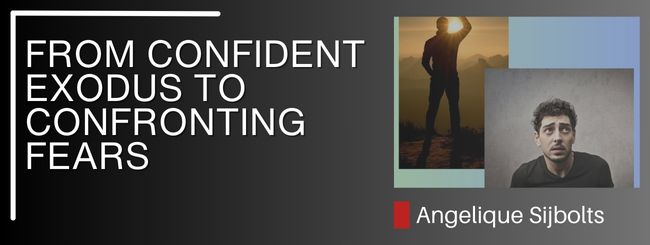בס”ד
PARSHAT Beshalach 5784
| Exodus 14:8 and 10 Hashem stiffened the heart of Pharaoh king of Egypt, and he gave chase to the Israelites. As the Israelites were departing defiantly, | וַיְחַזֵּ֣ק יְ”הֹוָ֗ה אֶת־לֵ֤ב פַּרְעֹה֙ מֶ֣לֶךְ מִצְרַ֔יִם וַיִּרְדֹּ֕ף אַֽחֲרֵ֖י בְּנֵ֣י יִשְׂרָאֵ֑ל וּבְנֵ֣י יִשְׂרָאֵ֔ל יֹֽצְאִ֖ים בְּיָ֥ד רָמָֽה: | |
As Pharaoh drew near, the Israelites caught sight of the Egyptians advancing upon them. Greatly frightened, the Israelites cried out to Hashem | יוּפַרְעֹ֖ה הִקְרִ֑יב וַיִּשְׂאוּ֩ בְנֵֽי־יִשְׂרָאֵ֨ל אֶת־עֵֽינֵיהֶ֜ם וְהִנֵּ֥ה מִצְרַ֣יִם | נֹסֵ֣עַ אַֽחֲרֵיהֶ֗ם וַיִּֽירְאוּ֙ מְאֹ֔ד וַיִּצְעֲק֥וּ בְנֵֽי־יִשְׂרָאֵ֖ל אֶל־יְ”הֹוָֽה: |
Rashi about verse 8 writes: Heb. בְּיָד רָמָה, lit., with a high hand. With lofty and openly displayed might.
Before my eyes, I see the children of Israel confidently marching out, fully relying on G-d’s well-established ability to overcome the Egyptians. They draw strength from the possessions they carry away from Egypt – food, gold, silver, and weapons – feeling invincible.
In stark contrast, Pharaoh, initially hesitant, was influenced by the plagues in Egypt. Although he initially granted permission for the people to leave, regret quickly set in, accompanied by hesitation. Nevertheless, G-d hardened Pharaoh’s heart, granting him the autonomy to make his choices. After two days, Pharaoh confidently initiated the pursuit, convinced that the people were trapped between Baal-Zephon – the only deity intentionally spared by G-d among all the Egyptian gods to mislead them – and the sea, with no escape. In Pharaoh’s eyes, his victory was already assured.
On the contrary, the children of Israel, who departed with unwavering confidence, now felt cornered upon the arrival of the Egyptian army and became afraid. The army, though impressive with 600 soldiers and their chariots, paled in comparison to the Jewish people, numbering 600,000 young men ready for battle. Chizkuni emphasizes that their fear stemmed from a slave mentality, fueled by various psychological aspects of fear resulting from physical and psychological abuse. After all, the master had the authority to decide on humiliation, abuse, punishment, or even death, instilling profound helplessness and breaking down any sense of self-worth and self-esteem. Slavery deprived them of autonomy, making it impossible, in their perception, to wield weapons and engage in battle. G-d recognized their lack of preparedness for such a challenge and led them away from the land of the Philistines to prevent the inclination to return to Egypt. And indeed we see this desire of the people to return expressed in their frustration towards Moses. They express that they would rather have stayed in Egypt than face death in the desert.
But why didn’t they place their trust in G-d after witnessing all the signs in Egypt? The Malbim points out that initially, they weren’t afraid of the army; they prayed to G-d for the army to turn back. However, when they checked if that happened, they saw that the army did not retreat. On the contrary, a much larger group of Egyptians followed the initial 6000 men. Their prayers seemed unanswered, and in fear, they cried out to G-d; that’s when they lost hope.
If G-d knew that the people were not yet ready for battle, harboring fear in their hearts, and that was the reason for diverting them from the land of the Philistines, what distinguishes this situation?
The people needed complete liberation from their old adversaries, to regain their autonomy and self-worth before facing new challenges. This battle was beyond their capacity, and so G-d fought it on their behalf. The enemy had to be defeated, or else fear would persist within them.
However, in contrast to the previous situation, where G-d fought on their behalf, the challenge here required the people to confront their fears, regain their confidence, and actively participate in their own deliverance. This marked a shift from passive liberation to a more active engagement in overcoming their obstacles.
Toxic relationships
Do we not sometimes see this in our own lives when we seek to free ourselves from relationships that are not good for us? We may decide that we want to leave them, and at times, circumstances force us to move on and explore new paths. Yet, in our minds, they linger, continuing to influence us, and we feel the constant pull to return to the old and familiar. After all, how easily do we forget the negative experiences and idealize the good moments? We cannot erase those positive experiences and memories from our minds, making true detachment challenging. Only G-d can achieve this for us, and only then are we genuinely capable of picking up the pieces of our lives, moving forward, and embracing new challenges.
Learning Points
1. Trust in Divine Guidance: The narrative underscores the importance of trusting in G-d’s guidance, as seen in the Israelites’ initial confidence in God’s ability to overcome challenges.
2. Impact of Past Trauma: The story highlights how past traumatic experiences, such as slavery, can have a lasting psychological impact on individuals and influence their reactions to present challenges.
3. Active Participation in Liberation: There’s a shift from passive liberation in Egypt, where God fought on behalf of the Israelites, to active engagement in the desert. This emphasizes the role of personal agency in overcoming obstacles.
4. Struggle with the Familiar: The Israelites’ desire to return to Egypt despite the challenges illustrates the human struggle to break free from the familiar, even when it may not be in their best interest.
By Angelique Sijbolts
Sources:
Rashi on Exodus 14:2:3
Chizkuni, Exodus 14:10:2
Malbim on Exodus 14:10:1
Text: Sefaria.org
With thanks to B. Yaniger for the inspiration and feedback
© Copyright, all rights reserved. If you enjoyed this article, we encourage you to distribute it further.
Our blogs may contain texts/ quotes or references of
Mechon-Mamre.org, Aish.com, Sefaria.org or AskNoah.org
that contain copyrights and which we may use with there permission.
